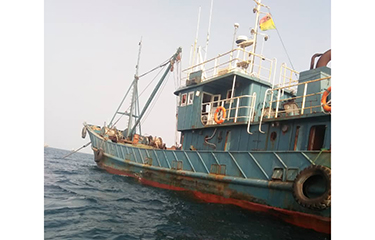Ghanaian fishermen decry arrival of Chinese trawlers

A group representing fishermen in Ghana has decried the recent arrival of three Chinese trawlers into the country’s waters, adding to the already illegal number of trawlers fishing in the country.
The Ghana National Canoe Fishermen Council (GNCFC), in an open letter to the Fisheries Commission, has opposed the arrival of three new vessels: Yu Feng 1, 3, and 4. The new vessels are docked at Tema in Ghana, and are awaiting fishing licenses from the country's Fisheries Commission.
Ghana is facing similar problems to Senegal, which is also dealing with an influx of foreign-based trawlers. Ghana had established a management plan with a maximum sustainable limit of 47 vessels, yet there’s currently 76 vessels licensed to fish as of the end of 2019, according to the GNCFC.
“The licensing of new vessels would not only contravene the laudable targets in the management plan, but also a government moratorium dating from 2012 on the issue of fishing licenses for new trawlers and the replacement of old vessels in the industrial trawl sector,” the GNCFC stated in the open letter.
Ghana, like other African countries – including Senegal – has rules that require all industrial trawlers be owned and controlled by Ghanaian nationals. However, according to the GNCFC, most of the industrial vessels in the country are owned by Chinese interests using shell companies as cover.
“These new trawlers arriving in Ghana are registered to local companies established in 2019 and with only a P.O. box as their address,” the GNCFC said. “Respectfully, we ask how it is possible that a newly established fishing company in Ghana can suddenly acquire one or two trawlers of this size with the costs involved? Is the Fisheries Commission able to confirm that it has investigated the beneficial ownership of these companies to ensure that only Ghanaian citizens will be controlling and profiting from the operations?”
According to a release from the Environmental Justice Foundation, Ghana’s fish populations are in “dire straits,” with catches crashing by around 80 percent in the last 20 years. The organization has issued reports indicating that the fishery is near collapse.
A big part of the problem is the “saiko” trade, when foreign trawlers sell juvenile bycatch to Ghanaian artisanal fishers, who then sell the fish to coastal communities.
“We continue to see large quantities of fish landed by saiko canoes at Elmina fishing harbor, even after government and industry committed to end the practice last November,” the GNCFC stated. “Trawlers are illegally harvesting the fish that would normally be caught by our artisanal fishers and selling this back to fishing communities in the saiko trade. This is having a devastating impact on the livelihoods of fishing communities.”
The EJF is calling on the Fisheries Commission of Ghana to refuse to license the trawlers.
“Over-capacity in the fishing fleet in Ghana is driving a crisis that will decimate livelihoods and food security in coastal communities,” EJF Executive Director Steve Trent said. “Ensuring that all fishing is legal, ethical and sustainable has never been more important – as the world reels from the impacts of COVID-19, communities will need these resources more than ever. The Fisheries Commission has the chance to do the right thing: heed scientific advice, refuse these trawlers a license, and protect Ghana’s fisheries and its people.”
Photo courtesy of the Environmental Justice Foundation






Share